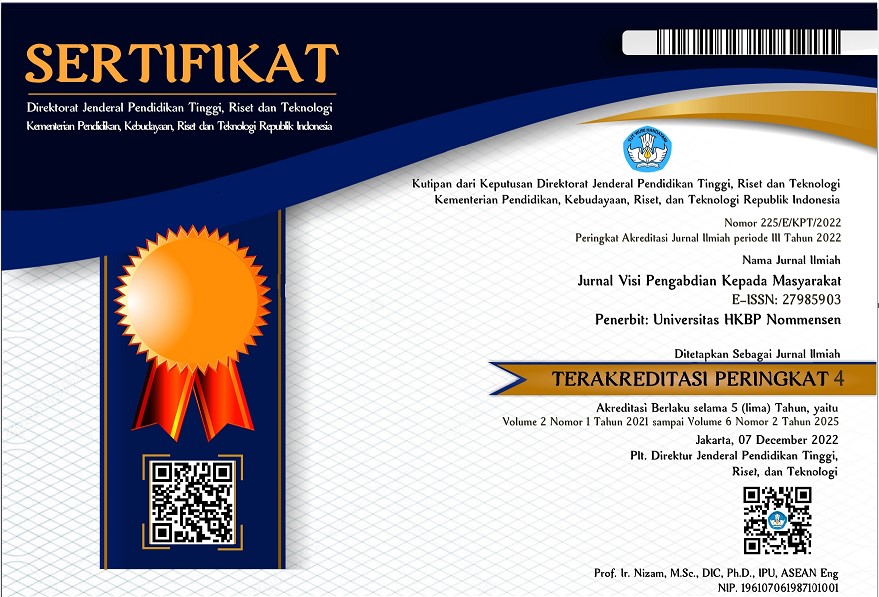Improving Students' Basic Emotional Management Skills Through the Emoji Card Method in the Malaysia International Teaching Volunteer Program
DOI:
https://doi.org/10.51622/pengabdian.v6i1.2645Keywords:
Emotional Management Skills; Early Childhood Education Programs; International Volunteer MalaysiaAbstract
This review summarizes the literature discussing emotional management among children, particularly students in the Quranic Learning Center (Taman Pendidikan Al-Quran) in Kuala Lumpur, Malaysia, using the emoji card method. The ability to recognize, understand, and manage one's emotions and those of others greatly aids in building relationships and addressing life's challenges. Moreover, awareness of biases and self-emotions supports daily learning processes and enhances students' academic growth. The method employed for this community service was an experimental approach with a One-Group Pretest-Posttest design. The implementation stages included: (1) initial partner condition mapping, (2) introduction and administration of a pretest using a socio-emotional assessment sheet, (3) training using the "Storytelling & Role Play Card Emoji" method, (4) mentoring by volunteer teams and individual counseling sessions, and (5) posttest administration with identical measurements to the pretest. The findings demonstrated that emotional management training significantly improved students' skills in the Quranic Learning Center in Kampung Baru, Malaysia. These results are pivotal as they provide short-term solutions to common student issues and empower them to better adapt to their learning and social environments. Thus, these outcomes contribute to the development of more effective and sustainable community service programs, fostering better personality development in addressing challenges.
Downloads
References
Danti Pudjianti, D. (2024). Pelattihan Lagu dan Gerak Bahasa Inggris Kepala Sekolah dan Guru RA untuk Anak Usia Dini . Jurnal Abdimas Prakasa Dakara .
Insan, R. W. (2020). Perkembangan Sosial Emosi Pada Anak Usia Prasekolah. Pendidikan dan Dakkwah.
Lafay, A., Berger, C., Alaria, L., Angonin, S., Dalla-Libera, N., Richard, S., Cavadini, T., & Gentaz, E. (2023). Impact of innovative emotion training in preschool and kindergarten children aged from 3 to 6 years. Children, 10(11), 1825. https://doi.org/10.3390/children10111825【30】.
Laili, H. M. (2020). Pengaruh Metode Role Play Terhadap Perkembangan Sosial-Emosional Pada Anak Usia Dini TH Dharma Wanita Persatuan Bluru Kidul, Kabupaten Sidoarjo. Universitas Muhammadiyah Sidoarjo .
Lakcsha Butler, S. (2022). Evidence and Strategies for Including Emotional Intelegence in Pharmscy Education. American Journal of Pharmaceutical Education .
Martinsone, B., Stokenberga, I., Damberga, I., Cefai, C., Bartolo, P., Camilleri, L., O'Riordan, M. R., & Grazzani, I. (2022). Social-emotional competence, behavioral difficulties, and learning outcomes in preschool children: Parent and teacher evaluations. Frontiers in Psychology, 12, 760782. https://doi.org/10.3389/fpsyg.2021.760782
Martono, W. C., Heni, & Karolin, L. A. (n.d.). Implementasi model pembelajaran experiential learning sebagai bagian dari program sekolah ramah anak. Seminar Nasional dan Call for Paper “Membangun Sinergitas Keluarga dan Sekolah Menuju PAUD Berkualitas. ISSN: 2655-6189.
Mar'atul Imtihan, M. H. (2022). Studi Kasus Anak-Anak Usia 5-6 Tahun yang Mengalami Gangguan Sosial Emosional Akibat Menggunakan Gadget di Desa Jero Gunung Kidul Kecamatan Sakra Barat Tahun 2021. Jurnal Ilmiah Profesi Pendidikan .
Suhana, M. (2017). Influence of Gadget Usage on Children's Social-Emotional Development . Atlantis Press Journal .
Published
How to Cite
Issue
Section
Copyright (c) 2024 Ulfah Munawaroh Munawaroh; Nugraini Aprilia, Trubus Raharjo

This work is licensed under a Creative Commons Attribution 4.0 International License.












